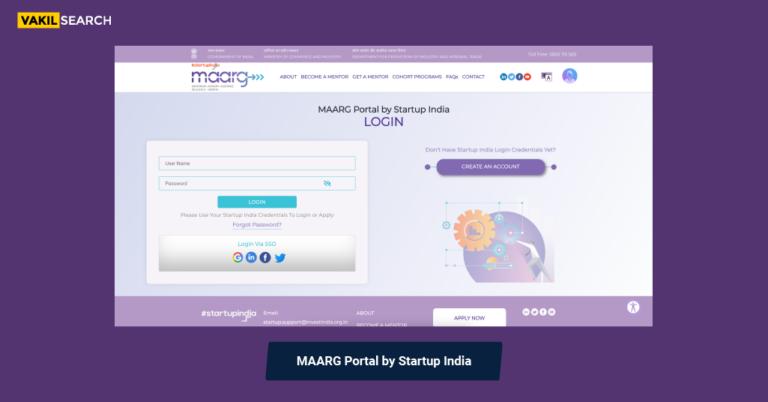Launched in January 2016, the Startup India Scheme was devised to build a good startup ecosystem for innovative enterprises in India. It not only encourages entrepreneurial spirit but also provides startups with multiple benefits,
Advantage of Government Support for Your Startup India Scheme, India has been rapidly growing as a startup hub in recent years, with the country seeing an increasing number of entrepreneurs starting their businesses. To support the growth of startups and encourage entrepreneurship, the Indian government has launched the Startup India scheme. The scheme offers various benefits and support to startups, making it an excellent opportunity for entrepreneurs looking to start or scale up their businesses.
In this article, we’ll discuss what the Startup India scheme is, how it can benefit your startup, and how you can take advantage of government support.
What is the Startup India Scheme?
Startup India is a flagship initiative of the Government of India, launched on 16th January 2016. The scheme aims to promote the growth of startups in the country by providing them with access to funding, mentorship, networking opportunities, and other resources.
The Startup India scheme has three main objectives: to simplify the regulatory framework for startups, provide funding support, and offer industry-academia partnerships.
Benefits of the Startup India Scheme
The Startup India scheme offers a range of benefits to startups, making it an attractive option for entrepreneurs looking to start or grow their businesses. Some of the key benefits of the Startup India scheme include:
-
Tax Benefits
The Startup India scheme offers tax benefits to startups for three years from the date of incorporation. Startups can enjoy tax exemptions on their profits if registered as a Private Limited Company or a Limited Liability Partnership (LLP).
-
Easy Compliance
The scheme easily complies with various regulatory requirements, including self-certification under six labour and three environmental laws. This helps to reduce the burden of compliance for startups, allowing them to focus on growing their businesses.
-
Funding Support
The Startup India scheme supports startups through various government initiatives, such as the Fund of Funds for Startups (FFS). The FFS supports registered Alternative Investment Funds (AIFs) that invest in startups.
-
Intellectual Property (IP) Protection
The scheme offers startups access to fast-track patent examinations at lower costs. This helps startups protect their intellectual property and gives them a competitive edge in the market.
-
Industry-Academia Partnership
The scheme promotes partnerships between startups and academia. This helps startups access to research and development facilities, expert advice, and mentorship from industry experts.
How to Take Advantage of Government Support for Your Startup
To take advantage of Government Support for Your Startup India Scheme, startups need to register with the Department for Promotion of Industry and Internal Trade (DPIIT). Here are the steps to register your startup with the Startup India scheme:
Step 1: Register Your Business
To register your startup with the Startup India scheme, you must first register your business as a Private Limited Company or a Limited Liability Partnership (LLP).
Step 2: Get Your Business Certified as a Startup
Once your business is registered, you need to get it certified as a startup by the DPIIT. To get your business certified as a startup, you need to provide the following documents:
- Certificate of incorporation/registration
- Description of the business
- Details of the founders, directors, and shareholders
- A brief write-up on how the business is innovative or how it is solving a problem
- Details of the funds received from any other entity
- Letter of recommendation from an incubator, accelerator, or industry association.
Step 3: Apply for Benefits
Once your business is certified as a startup, you can apply for the benefits offered by the Startup India scheme. Here are some of the benefits you can apply for:
- Tax Benefits: To apply for tax benefits, you need to file an application with the Inter-Ministerial Board (IMB) set up by the DPIIT
- Funding Support: To apply for funding support, you can apply to registered Alternative Investment Funds (AIFs) that are part of the Fund of Funds for Startups (FFS)
- IP Protection: To apply for fast-track patent examination, you need to apply with the Controller General of Patents, Designs and Trademarks
- Industry-Academia Partnership: To apply for industry-academia partnerships, you can reach out to incubators, accelerators, and industry associations that are recognized by the DPIIT.
In addition to the above benefits, startups can participate in various initiatives and programs under the Startup India scheme, such as the Startup India Showcase, which provides a platform for startups to showcase their products and services to potential investors and customers.
Challenges Faced by Startups in India
While the Startup India scheme offers several benefits and support to startups, there are also various challenges that startups face in India. Some of the key challenges include:
-
Lack of Access to Capital
One of the biggest challenges startups face in India is the need for more access to capital. Although the government’s efforts to promote funding support for startups, access to capital remains a major barrier for many startups.
-
Regulatory Burden
While the Startup India scheme offers easy compliance with various regulatory requirements, startups still face a significant regulatory burden in India. The country has a complex regulatory framework that can be challenging for startups to navigate.
-
Talent Shortage
Another challenge faced by startups in India is the need for more skilled talent. Many startups need help finding and retaining talented employees, hindering their growth and success.
-
Infrastructure Challenges
Startups in India also need infrastructure challenges, such as a lack of reliable internet connectivity and inadequate transportation infrastructure.
Conclusion
Taking advantage of government support for your startup can be a game-changer. The Startup India scheme offers an excellent opportunity for startups to access funding support, mentorship, and other resources to grow their businesses. By registering with the DPIIT and applying for the scheme’s benefits, startups can take advantage of government support and scale up their businesses. However, it is important to recognize the challenges faced by startups in India and work towards addressing them to ensure the growth and success of the startup ecosystem in the country. Vakilsearch, a legal services provider in India, can assist startups with registering with the DPIIT and navigating the regulatory landscape. Our can also guide on accessing funding support and protecting intellectual property.
FAQs on the Startup India Scheme
What is the Startup India Scheme?
The Startup India Scheme is a flagship initiative launched by the Government of India in 2016. Its primary aim is to boost the entrepreneurial ecosystem in the country by promoting startups, driving sustainable economic growth, and generating large-scale employment opportunities.
How does it support aspiring entrepreneurs and startups?
The scheme offers multiple layers of support to entrepreneurs. From reducing the regulatory burden with faster patent registrations and reduced costs to providing handholding and incubation support, the initiative aims to make it easier for startups to commence and operate. Additionally, it helps in facilitating public procurement from startups and aids in accessing funds through a Fund of Funds structure.
What are the eligibilities to register under the Startup India Scheme?
To register under the scheme, startups must be: 1. An entity (LLP, Private Limited Company, or Partnership) incorporated in India for less than 10 years, 2. Have an annual turnover not exceeding INR 100 crores for any preceding financial year, 3. Work towards innovation, development, or improvement of products/services and should be driven by technology or intellectual property.
How can startups avail of benefits from the Startup India Scheme?
Startups need to register themselves on the Startup India portal. Once registered and recognised, they can apply for various benefits including tax exemptions, easier compliance, mentorship opportunities, and potential access to funds under the scheme.
What types of financial and non-financial assistance are available under this scheme?
Financial Assistance: Startups can potentially access funds through the scheme's Fund of Funds structure, which is aimed at ensuring they receive timely finance. Tax exemptions on investments above Fair Market Value, exemptions from Income Tax for three consecutive years, and exemptions on capital gains are also part of the financial benefits. Non-Financial Assistance: This includes easier compliance with the reduced regulatory burden, faster patent registration, handholding, incubation facilities, mentorship opportunities, and facilitated public procurement.
Are there any specific tax benefits or exemptions provided to startups registered under Startup India?
Yes, startups recognised by the Department for Promotion of Industry and Internal Trade (DPIIT) can avail themselves of income tax exemptions for three consecutive years. Additionally, they can benefit from exemptions on capital gains and on investments made above Fair Market Value.
Read More,
- What is Startup India Scheme?
- Raise Capital for Startup Business
- Startup India Scheme – Eligibility, Tax Exemptions & Types of Benefits










